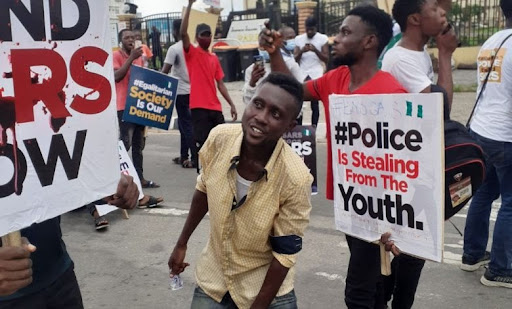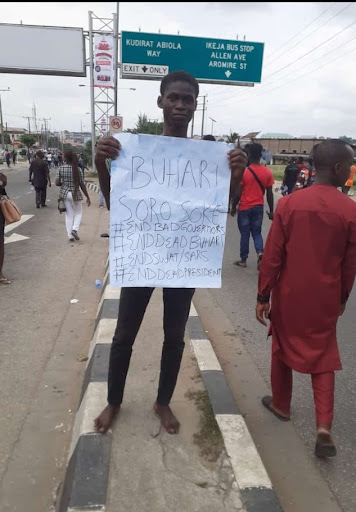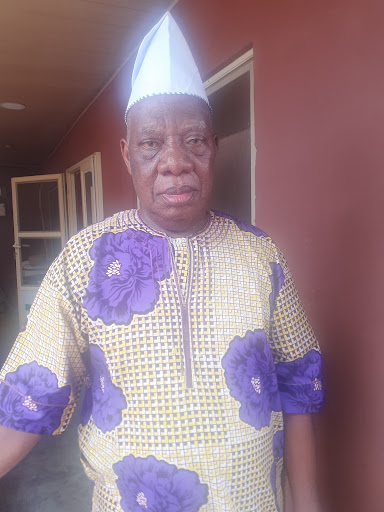#EndSARS: Why Young Nigerians Need To Lead The Country
The EndSARS protests have shown that the Nigerian youths are capable of strategic planning and galvanizing, showing that youth participation is critical to effective governance.

Youthful agitation for representation in governance in Nigeria morphed into The Not Too Young to Run Act. The movement, according to activists, was borne out of a yearning for a change from the gerontocracy the older politicians have created in the country’s political landscape.
As a result of the Act, there is an improvement in youth participation with youth candidacy increasing from 21 per cent in 2015 to 34.2 per cent in the 2019 general elections. Despite these changes, the number of youth between 18 and 29 (based on the youth definition given by the National Youth Policy), voted into elective positions in Nigeria is less than 1 per cent. This is despite youths making up over 67 per cent of registered voters in the country.
Nigeria has a rich history of young leaders who have been political frontliners and have helped shape some of the most defining moments in the country’s history. Yakubu Gowon, Murtala Muhammed and Olusegun Obasanjo all held significant positions of political power in their 30s.
#EndSARS protests and its youthful ‘governance’
The protests erupted as a reaction to a series of continuous police brutalities across the country. The events that led to the demonstrations were spontaneous too. Despite this, the #EndSARS protests remain one of the most organised civic movements in Nigeria’s democracy.

The Feminist Coalition, a group formed to champion gender equality, was a leading party in the protest, receiving donations and disbursing over $400,000 for the protest.
On the various protest grounds, there were vendors and distributors, there were photographers and videographers. People who volunteered to play conscious music and those who helped out with logistics. They handled the protests through technological prowess and administrative sagacity.
Volunteers gave out protest placards and others wrote on them; medical teams were also available to administer treatment to injured protesters. The youth also provided private security as many of them claimed to have lost confidence in the security apparatus of the state; they formed their own government.
Finally, at the end of each day’s activity, which lasted for up to two weeks, another set of volunteers would pick up the trash and ensure their proper disposal. The movement, therefore, gave the young people an avenue to exercise their leadership ingenuity and function in various management capacities.
These efforts made older Nigerians see some potential in youthful governance and a “political coming-of-age.”
EndSARS protests as a united front
The narrative that Nigeria is divided along tribal and religious lines didn’t gain any traction during the demonstrations. There was common agitation and it was enough to pull the youthful crown across over 13 cities across the country.
The protest found footing across the major geo-political zones in the country, signalling a strong, united front, devoid of tribal and religious differences.
“We must recognise that our problems and solutions are blind to the tribe, religion, ageism and gender,” says Kazeem Israel, a youth activist. Israel added that the voices of the youths became even louder than that of segregation as all forms of barriers were broken during the demonstrations.
According to him, the movement has shown us as a people that the youths can be unified even in diversity and thus an important part of the society.
“Nigerian youth have never been lost in the quest for nationhood, it is fundamental to have youths driven with the right ideas and motivation to drive a government that puts people above profit.”
The younger ones can’t tolerate as much as we have tolerated
Pa Joseph Oyewole, 72, belongs to the demographic sometimes called the “silent generation” or traditionalists. As far as he is concerned, the protest only marked the beginning of a “stronger revolution.”
He pointed out that “the younger ones can’t tolerate as much as we have tolerated. This is evident in their going all out on the streets.” He argued that the conduct of the policemen is only a reflection of the larger society.
“It looks like our dog is going back to its vomit. The policemen who are to be guardians have corrupted themselves so much that they behave like politicians and care less about other people because they want to become rich. The EndSARS protest was just the beginning of the end. The police are part of us. My child can be the police and vice versa, so it’s a societal thing. Those called police were not born wicked but we made them so.”
Pa Oyewole added that a youth-led Nigeria is possible if the young are given a chance.
Significance of the protests
At his Alimosho Lagos home, Professor Ogungbade told HumAngle that he can’t say for certain if the protests would be significant in Nigeria’s history. “It is time that will tell. The people who caused havoc to the instrumentality of the state will continue to suffer the havoc,” he said.
Born in 1945, he submitted that brutality doesn’t mean anything to people who by their nature are brutal. “Brutality doesn’t start with police and can’t end with police.”
Ogungbade lamented that some of the destructive activities by hoodlums that went on during the protests is what Nigeria would continue to remember. According to the retired academic, understanding Nigeria requires doggedness, thorough research and having a direct focus on what the country is.
He added that the distinguishing factor between the #EndSARS protests and others say that many protests in the past had electioneering undertones while nothing of such triggered the October 2020 protests.

“No president should be older than the country,” a 50-year-old had said during the EndSARS protests last year.
He added that Nigeria has a 76-year-old president as at the time the country marked its 60th independence anniversary and come 2023 “the president should be light years younger than the country.”
Discussing the way forward, Mr Gbolahan Olojede, a public affairs analyst, called for the preparation and grooming of young people in terms of character and competence, as, according to him, “age has never been the problem of leadership.”
“Active participation in governance is also important before emerging as leaders as power is never served a la carte.”
He appraised the tremendous organisational capacity of the protesters which he described as extremely potent attributes that the youths can deploy to become more involved in leadership.
He showed optimism at the potential of young people to “hold” power especially with the way they were able to raise funding for the protests which he thinks can be deployed into raising money to contest elections too.
Support Our Journalism
There are millions of ordinary people affected by conflict in Africa whose stories are missing in the mainstream media. HumAngle is determined to tell those challenging and under-reported stories, hoping that the people impacted by these conflicts will find the safety and security they deserve.
To ensure that we continue to provide public service coverage, we have a small favour to ask you. We want you to be part of our journalistic endeavour by contributing a token to us.
Your donation will further promote a robust, free, and independent media.
Donate HereStay Closer To The Stories That Matter




